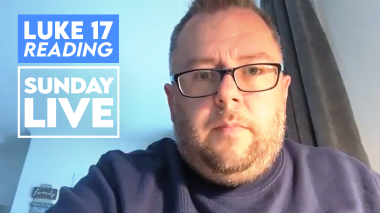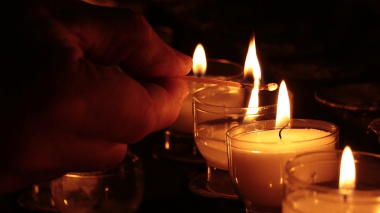Christian Creatives Blog 1: Poetry with James Cathcart

In 'Christian Creatives', a new fortnightly podcast series, Laura Digan discusses sources of inspiration, practicalities and managing confidence with creatives from different disciplines. Each week, to encourage you to grow your creative skills and confidence, the featured artist will set a creative activity for you to take part in. In the first episode she speaks to the poet James Cathcart and he has set a creative writing challenge for us. Have fun with it!
James’s creative writing activity
As I say in the podcast — when writing try to avoid starting with a blank page. It’s always easier to bounce off something (even if you end up very far from that original ‘something’) than it is to go from a standing start. So for this activity I want you to start with a number.
Pick a number between 1 and 150.
Terror, delight, anguish, triumph, agony, contentment, tears, laughter…. you will find all of these in the psalms, sometimes all in one psalm! Human life in all its beauty, messiness and wonder is depicted in these poems and songs.
Look up the psalm that corresponds with the number you chose at random. Go through it a few times (if your number was 119, settle in as you will be a while…) and note down the words that stand out for you in the translation you are reading. Also consider your response to the words as you read — do they inspire you/confuse you/startle you/comfort you/surprise you? The Bible is a rich and layered resource and it’s okay to have a rich and layered response to it. Bring all of who you are to all of what it is and invite God into the conversation.
Now that you have a number you can add your name like so:
‘119, James’
Then leave a blank line. The poet Simon Armitage talks about poetry as a concrete art form. Prose flows like water on and off a page, he explains, but poetry is fixed. The space left matters.
 Then start writing down some of the words that struck you from the psalm (zeal, incline, shield…). And go on from there telling God how you feel about the psalm — you could even have a stab at rephrasing the sentiment of the psalm in your own words (‘Your words are a 1000 watt floodlight to my old running shoes’). Deliberately blur the line between prayer and poem. Don’t worry about the end result. If as you are writing you stumble across a rhyme (or even better a near rhyme) then go for it. There will be time later to reread and rewrite and introduce more structure but for now just enjoy feeling your way. And don’t be afraid to start a new line — line breaks in poetry are a helpful way of adding pauses to separate thoughts or to throw in some
Then start writing down some of the words that struck you from the psalm (zeal, incline, shield…). And go on from there telling God how you feel about the psalm — you could even have a stab at rephrasing the sentiment of the psalm in your own words (‘Your words are a 1000 watt floodlight to my old running shoes’). Deliberately blur the line between prayer and poem. Don’t worry about the end result. If as you are writing you stumble across a rhyme (or even better a near rhyme) then go for it. There will be time later to reread and rewrite and introduce more structure but for now just enjoy feeling your way. And don’t be afraid to start a new line — line breaks in poetry are a helpful way of adding pauses to separate thoughts or to throw in some
drama
and tension
or humour.
Stop after a bit and read what you have written. See what strikes you — did something come out that was surprisingly good? Was there a phrase that would make a good title? Could certain lines work if moved around next to each other? Keep asking questions and keep experimenting. The point here is to enjoy writing and get a feel for it like a painter doodling with colours or a potter mucking about with spare clay. We are not here to get a wonderful finished poem — we are here to enjoy writing and see where it takes us. It may be that somewhere in your words is a nugget — a nugget that will turn into something else. But don’t worry. Nuggets come and nuggets go. Enjoy prospecting.
James Cathcart
Listen to Laura interviewing James in the Christian Creatives podcast.




 Add to Favourites
Add to Favourites







Login to comment.